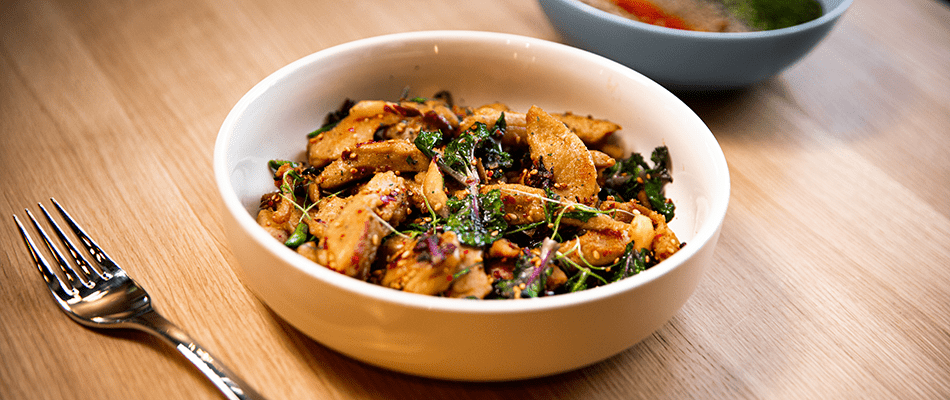
Planted Foods was one of nine young Swiss companies recently nominated for the Swiss Economic Award. With its meat substitutes made from plant-based protein, Planted wants to kick-start a consumption revolution and make the world a bit better. One of its particular targets is people who like eating meat and don't want to sacrifice their pleasure.
A success story
Planted Foods AG was founded in July 2019 by Pascal Bieri, Lukas Böni, Eric Stirnemann and Christoph Jenny and is based in Kemptthal in the canton of Zurich. Pascal Bieri's attention was drawn to meat substitutes in the US in 2017. However, these products didn't correspond with his idea of healthy food. He contacted his cousin, Lukas Böni, who was just about to finish his doctorate in food processing technology. Together they formulated a plan to produce plant-based food that was also natural and healthy. Professor Erich Windhab from the Swiss Federal Institute of Technology (ETH) put them in touch with Eric Stirnemann, who was studying to obtain a doctorate at ETH and who had a considerable understanding of the wet extrusion process. This method is used by Planted Foods for the production of its plant-based meat. The team was rounded off by Christoph Jenny, a finance expert with a great deal of experience in gastronomy. With CHF 150,000 from the "ETH Pioneer Fellowship," the four co-founders established Planted Foods AG, or Planted for short, in 2019. Planted employs around 100 employees – mainly in Switzerland but also in Germany, Austria and France.
Camilla Perotti, Lead Analytics, and Ladina Schröter, Lead Public and Regulatory Affairs, are responsible for "Sustainability" at Planted. We spoke to them about the different dimensions of sustainability, its implementation and measurable CO2 targets.
What does sustainability mean for Planted?
Ladina Schröter: We view sustainability holistically from different perspectives. When Planted was founded, both ecological and ethical considerations, such as environmental protection and animal welfare, were the focus, alongside health-related aspects. Fairness plays an important role in this: we want to leave future generations a planet that is worth living on. Up to 18 percent of global greenhouse gas emissions come from livestock. This is more than the exhaust emissions from all cars, trucks, airplanes and ships together. Food is one of the greatest levers that we have to make our future more sustainable. Through our plant-based products, we contribute to reducing meat consumption and therefore have a positive influence on our carbon footprint.
Camilla Perotti: Sustainability also has a social element. We form partnerships for the benefit of all those involved. Respectful interaction is important to us: both within the company but also in the form of fair employment conditions in the production chain. We only work with partners and suppliers who agree with our principles and who share our values. Together we work to further our vision. At Planted, 49 percent of the workforce are women, while women make up 57 percent of management positions. Our employees come from 19 different nations.
Sustainability and generational fairness
Both Planted Foods as well as Vita are committed to sustainability and generational fairness. Therefore, the young company chose a pension solution from the Vita Collective Foundation. Vita stands for fair, sustainable and transparent occupational pension planning. It provides information about the unintentional redistribution in the second pillar and develops pension solutions that ensure the biggest possible part of the investment returns go to the insured person to ensure that future generations can also enjoy a carefree retirement. In addition, the Vita Collective Foundation invests your entrusted pension assets sustainably and broadly diversified according to ESG criteria (Environmental, Social and Governance). Planted Foods would also like to shape a more sustainable future and leave behind a planet worth living on for future generations. The plant products contribute to reducing meat consumption and thus have a positive effect on the CO2 balance.
Are there any other specific examples of how Planted embodies sustainability?
Camilla Perotti: We recently started measuring the ecological footprint of our products. For this purpose, we work with Eaternity – a Swiss company that investigates the carbon footprint of food products. The life cycle assessment considers all stages from cultivation through transport and the production process to the consumer. The results show that our planted.chicken causes 74 percent fewer greenhouse gas emissions than the animal variety. In addition, 71 percent less water is consumed compared with an average food product. We now calculate the carbon footprint for all our products and then set specific goals for how we can improve further based on the results. On a corporate level too, we will measure where we consume most resources.
Ladina Schröter: When we built our production facility in Kemptthal, energy efficiency was the priority from the start. It was an integral component of planning. We use the heat that is generated during production to heat our offices. Solar panels will soon be installed on the roof. For our planted.pulled, an alternative to pulled pork, we use pea protein as well as oat and sunflower protein. The sunflower protein comes from the press cake of sunflower oil production and is extremely rich in protein. By using the by-products of other food areas, we conserve resources.
How does Planted manage to combine economic growth with sustainability?
Ladina Schröter: For us, sustainability and economic success are not contradictory but go hand in hand. Sustainability is part of Planted's DNA, and our values are reflected in our value creation chain. As a consequence, growth means greater impact in our case. However, the desire also comes from our customers: they are increasingly conscious in their food choices and are looking for ways to make their consumption more ethical. Via the web shop, we get valuable feedback that enables us to improve continuously.
Camilla Perotti: Transparency is also important to us. Within the company we promote an open feedback culture. We are also extremely transparent where our consumers are concerned. Production takes place in a greenhouse that is located within the building. We organize company tours: everyone can see how our meat is produced. This is in complete contrast to slaughterhouses, where everything takes place behind closed doors. We use only a few, select natural ingredients without additives.
Where is Planted headed: What are your goals?
Camilla Perotti: For this year we have ambitious but extremely realistic plans: expansion into other European countries. We will also expand production so that we can satisfy the increased demand. A sound data basis will enable us to set concrete sustainability goals both on a product and a company level.
Ladina Schröter: In the medium term, we will also expand the product range. Our Product Development and Science department has big ambitions: to be able to offer the right product for all needs in future. We are launching a classic next – planted.schnitzel. Before any product launch, we get feedback from our consumers by offering prototypes in the web shop. By the time the product appears on the market, it has already gone through several development cycles.
Which product currently gives you the greatest pleasure?
Ladina Schröter: We are currently involved in a cultivation project that aims to enable the cultivation of peas in Switzerland that we can use in our products. In Switzerland, yellow peas are only grown rarely – and are fed to farm animals. But it's possible to cultivate yellow peas for human consumption in Switzerland. Our project partners are currently conducting initial field tests. We expect to be able to carry out the first tests in our production area at the start of 2022. We currently get our peas from Western Europe, primarily from France. It is important to us to avoid long transport routes wherever possible and to work with producers who share our values. Up to now, demand for Swiss peas for food production was not particularly large. But that is now changing, so we are hopeful that we will be able to obtain peas from Switzerland for our products in the future.

Camilla Perotti
At Planted, Camilla is responsible for the Analytics area and forms the Sustainability working group alongside Ladina. This enables her to combine two of her greatest passions: cuisine and sustainability.

Ladina Schröter
Ladina is responsible for Regulatory and Public Affairs at Planted. She has been vegetarian for over ten years and takes pleasure in the meaningfulness of her work.
Q&A
Where can I buy products from Planted?
Planted's plant-based meat substitutes are available online and in retail stores. Planted products can also be found in many restaurants in Switzerland.
What does fairness mean to Vita?
Vita is dedicated to fair play in occupational retirement provision and provides transparent information about undesired redistribution in the second pillar. We develop pension planning solutions that ensure that as much of the investment income as possible also reaches the insured persons. This means that future generations will also be able to enjoy a worry-free retirement.
Does Vita invest pension funds' assets sustainably?
As a responsible investor, the Vita Collective Foundation invests pension funds' assets sustainably and with broad diversification. It takes into account ESG (environmental, social and governance) criteria, has signed the United Nations' Principles for Responsible Investment (UN PRI) and is a member of Swiss Sustainable Finance (SSF).